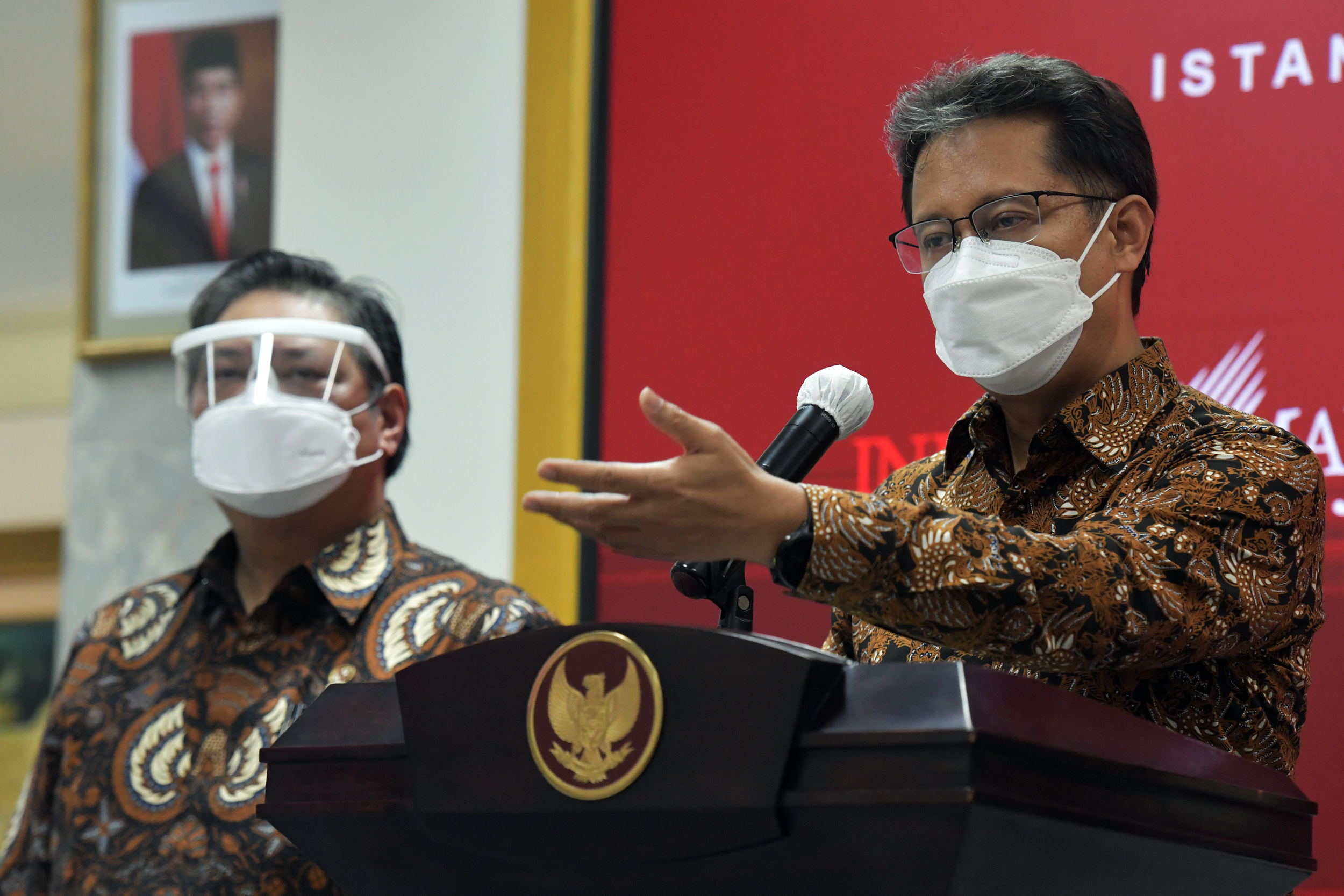Gov’t Takes Measures to Control COVID-19 Case Spike in Kudus, Bangkalan

Minister of Health Budi Gunadi Sadikin delivers a press statement after a limited meeting on COVID-19 pandemic management in Jakarta, Monday (07/06/2021). (Photo: PR of Cabinet Secretariat/Rahmat)
The Government has taken several measures to control the spike in COVID-19 cases following Eid al-Fitr holiday, Minister of Health Budi Gunadi Sadikin has said.
The Minister added that he has also inspected the regions that have seen COVID-19 case surge, including Kudus regency in Central Java province and Bangkalan regency in East Java province, along with Head of the National Agency for Disaster Management who also helms the COVID-19 Task Force, Chief of the Indonesian National Police (Polri), Commander of the Indonesian National Defense Forces (TNI), and other related parties.
“The first (measure), the most important as it deals with lives, we divide the pressure of burdens in hospitals by referring patients with severe and moderate (symptoms) to the nearest city, for Kudus to Semarang, for Bangkalan to Surabaya,” he said after a limited meeting on COVID-19 pandemic management led by President Joko “Jokowi” Widodo in Jakarta, Monday (07/06).
For the record, the bed occupancy rate in Kudus regency soared from 40 patients to 350 patients in the past 1.5 weeks. Likewise, in Bangkalan regency, the isolation bed occupancy rate shot up from approximately 10 patients to 70-80 patients.
“The radical increase is due to a significant spike in cases in these clusters as, indeed, Kudus is a pilgrimage area, whereas, in Madura island (where Bangkalan is located), many Indonesian migrant workers have returned from neighboring countries,” the Minister said.
Meanwhile, the capacity of hospitals in Semarang city and Surabaya city, the Minister added, is sufficient to accept referrals from the two regencies. He went on to say that out of 72,000 beds allocated for COVID-19 patient treatment nationwide, 31,000 have been occupied.
“We still have enough isolation bed reserves. We have prepared 72,000 isolation beds. As of 18 May (2021), only 22,000 have been occupied. There is indeed an increase currently up to 31,000,” he remarked.
To divide and reduce the pressure on hospitals in Kudus and Bangkalan regencies, the Minister stated, Ministry of Health has joined hands with the Indonesian Medical Association and the Indonesian National Nurses Association to send doctors and nurses to fill the shortage of health care workers since many of them have been infected by COVID-19.
“In Kudus, over 300 health care workers have been infected. Since they all have been vaccinated, thank God, as of now, they are still in good condition, including a 70-year-old specialist physician,” he said, adding that the Government has also taken measures in the upstream, one of which is to continue increasing discipline in observing health protocols.
“I urge all heads of regions to ensure that health protocols (wearing a mask, maintaining a safe distance, and washing hands) are tightened and explained well,” the Minister stressed while also urging them to intensify T3 measures, namely testing, tracing, and treatment.
“Do carry out tests with discipline and please report (the results) completely. That way, we can anticipate positive cases,” he said.
The Minister also urged the public to participate in tracing. “Do not reject tracing. Do not worry when we ask, so we can reduce the transmission rate. We run tests on our closest people, our closest partners,” he stated.
Another measure to control COVID-19 in the upstream, according to the Minister, is to speed up vaccination.
“We have dropped 50,000 (doses of) vaccine specifically for Kudus regency, so the people can be injected immediately. We have also dropped them in Bangkalan. We will soon drop 50,000 (doses of vaccine) to reduce the risks of transmission,” he said.
Closing his statement, the Minister reminded the public that the spike in COVID-19 cases after Eid holiday is likely to continue to occur up to 5-7 weeks after the holiday season.
“Based on our previous experience, the peak of case surge occurred 5-7 weeks after the holiday season. So, we have predicted that we will still see a spike in cases until the end of this month or the beginning of next month with the preparation we have carried out,” he remarked. (TGH/UN) (DH/MUR)








